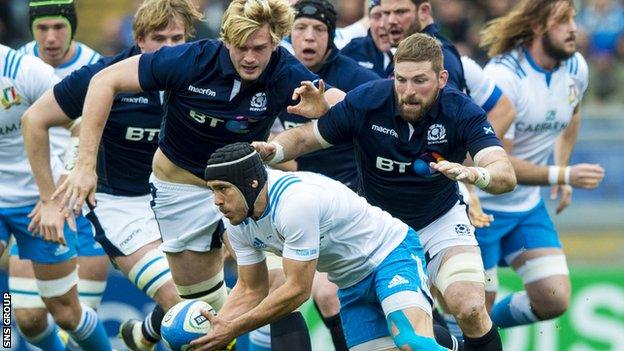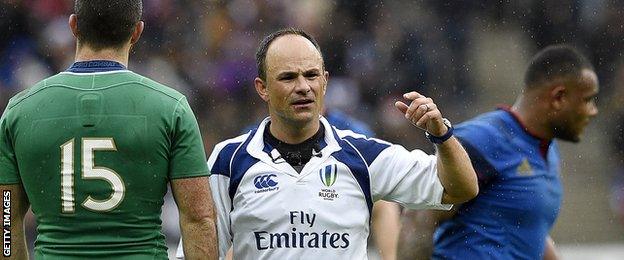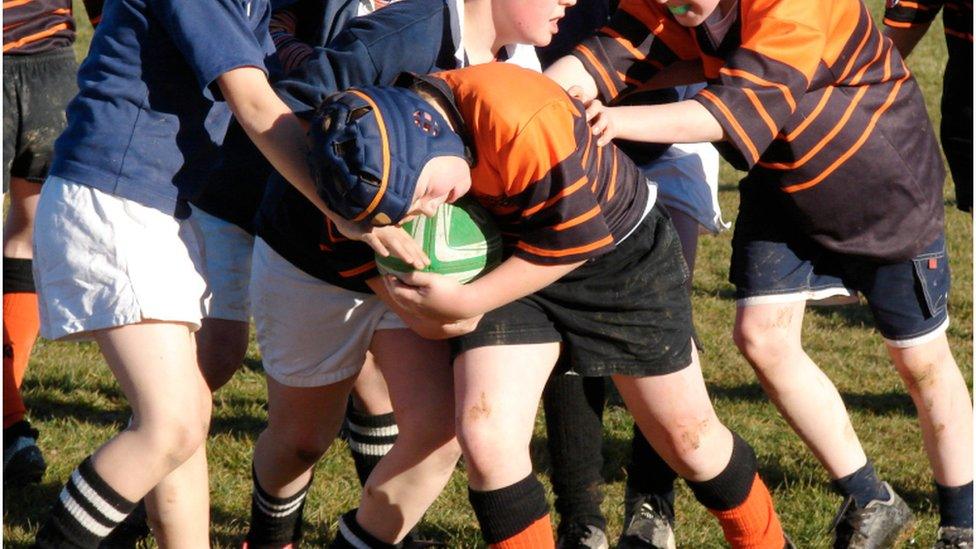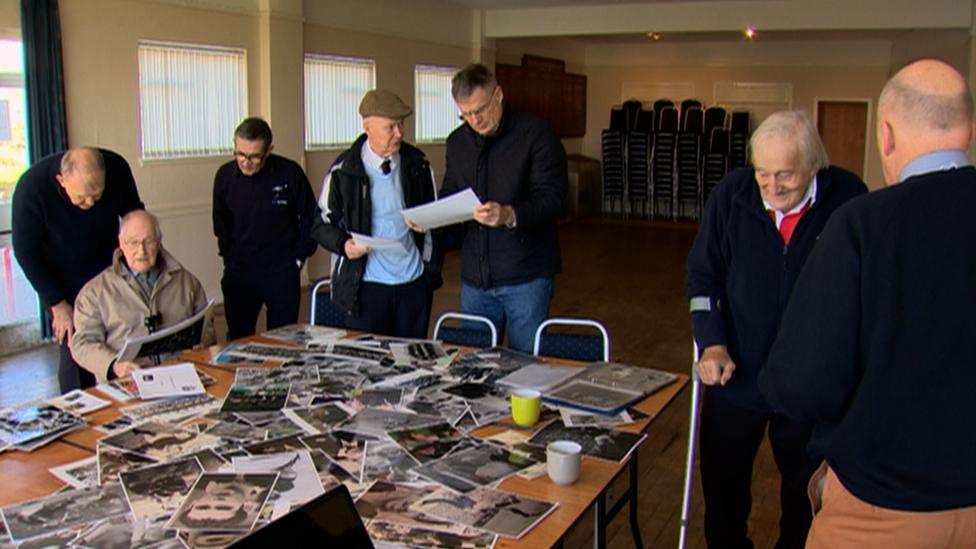Tackling in rugby: Game needs to address growing safety concerns
- Published

Tackling in international rugby is growing ever more ferocious
As soon as the news dropped about the 70 doctors and academics who are calling for a ban on tackling in schools rugby in the UK and Ireland you could hear the thunder coming over the hills from supporters who love the game as it is.
"Bleeding-heart liberals" was how former England international Jon Sleightholme described the people behind the open letter to government ministers outlining why tip and tag should replace contact rugby in schools.
The rationale of these medical experts is obvious. Tackling has become dangerous and it has led to an increased number of injuries.
They have stats to back up their point. Tackling as we know it has to stop, they say - or else those numbers are going to grow ever higher and the injuries ever more serious.
The other view is that if kids aren't allowed to tackle in schools rugby then they can't possibly be ready to play rugby after school, so either they give it up (and rugby begins to die) or they play on and get hurt (because they haven't been taught how to tackle) - and then they give it up.
Either way, a ban on tackling in schools would be akin to the beginning of the end of rugby.
Comparisons are made. What about heading the ball in schools football? It has been linked to concussion. Let's have some data. Shouldn't that be banned?
In my primary and high school in Ireland, hurling was the main sport. I have pals who, 30 years later, have misshaped fingers and scarred heads because of all those flying sticks. Ban it?
Former Scotland rugby player John Beattie hears from other former players who fear that their sporting career has caused brain damage
All about 'the hit'
You could carry on with a game of whataboutery all day, but there's no point. There is an uncomfortable truth in all of this for rugby and that is, to an extent, the game has brought this kind of study on itself.
Rugby has arrived in a place where it's not just about the tackle anymore, it's about the 'hit', it's about how hard one player can hit another.
A good tackle is admired, but a huge hit draws whoops and hollers from the sidelines. A strapping 12-year-old can empty a kid of the same age but about three stone lighter and knock him into next week and there is rejoicing.
I spoke to Jim Telfer about this not that long ago. He said that it annoys him to see it. Rugby at that age should be played not in terms of age groups but weight groups.
"We're going down a bad road when we have kids of the same age but of huge physical differences colliding with each other," the former Scotland coach remarked.
Should the tackle be banned in schools? No, it shouldn't. But it should be coached and policed better than I suspect it is in places. The policing (or non-policing) of the tackle, or the ruck, is evident at professional level. That's where the love of the big hit comes from.
The message from officials
In this Six Nations we have seen some awful episodes go largely unpunished.
This is part of the reason why rugby is under the microscope. Foul play happens and nothing is done about it.
Last Saturday in Rome, Scotland captain Greig Laidlaw was picked up at the side of a ruck by a big Italian forward and dumped into the ground on his back and head. The 'tackle' happened well away from the ball. Laidlaw mentioned it not once but twice to Jaco Peyper but the referee showed no interest in listening to him.
What kind of message was being sent out there?
On the second weekend of the Six Nations Peyper was in charge when French lock Yoann Maestri took out Ireland's Jonny Sexton with a late hit. He smashed his elbow into the fly-half's head and knocked him to the floor.

Referee Jaco Peyper has been at the heart of some controversial moments in the Six Nations
Peyper deemed it only worthy of a penalty to Ireland. No yellow or red card for a deliberate attack on a player's head. Again, what's the message to school kids?
In the same game, French hooker Guilhelm Guirado made a scandalous high-tackle on Irish wing Dave Kearney. It was an awful tackle but again the punishment was just a penalty.
There was another incident at the weekend when England's Mike Brown kicked Conor Murray in the head while the Irishman was on the ground.
The defence of Brown is that Murray had hold of the ball and that Brown was kicking at the ball not the man. The reality is that Brown's boot connected with Murray's head and drew blood. It was, at the very least, reckless. A yellow card. But Brown has been spared sanction of any kind.
Media storm
Rugby is a monumentally great game but it's troubled.
It took so long to wake up to the dangers of concussion that none of us knows what damage has already been done to players who have retired and are diminished by what happened to them in their playing years.
Concussion in rugby and its link to CTE, external - punch drunk syndrome or dementia - is a train that's coming down the tracks and we don't know how many former players are going to be on it.
This is another area where the game has a problem. Recently, Sexton talked about his experiences of concussion. He said they weren't anywhere near as many as people had made out but that every time he went down injured journalists assumed he was concussed.
He even said that it was getting to the stage where he might be reluctant to admit publicly to head injury because of the likely media reaction.
Numerous other players of my acquaintance have talked, in confidence, about the same issue.
John Shaw describes living with "cut-out moments" when his mind wanders
An international player, who didn't want to be named, told me recently: "If I get a concussion I'm less likely now to talk about it publicly because there is a hullabaloo about it.
"Everybody piles in, journalists and medics in the media. You go down injured in a game with a shoulder knock and you read that you're concussed but you were allowed to play on.
"You get a bang in the head, but it's just a bang in the head and not a concussion, and there's a debate about the brain trauma you've suffered when you haven't suffered it.
"If players feel less inclined to talk about concussion openly then that's a worrying development. And I can see it happening."
The physicality of rugby is something we talk about endlessly. We admire it. At times, we revel in it.
There are medical people who can't see the beauty of the game for all the brutality and that's understandable. Their idea of banning tackling in schools is not any kind of solution, but rugby has a problem, that much is clear.
How helpful it would be to form a brains trust of current and former players to explore ideas on how to address the issues that will continue to ail the game and draw the heat from the outside.
- Attribution
- Published2 March 2016

- Attribution
- Published15 February 2016

- Published26 February 2015
- Published14 September 2016
